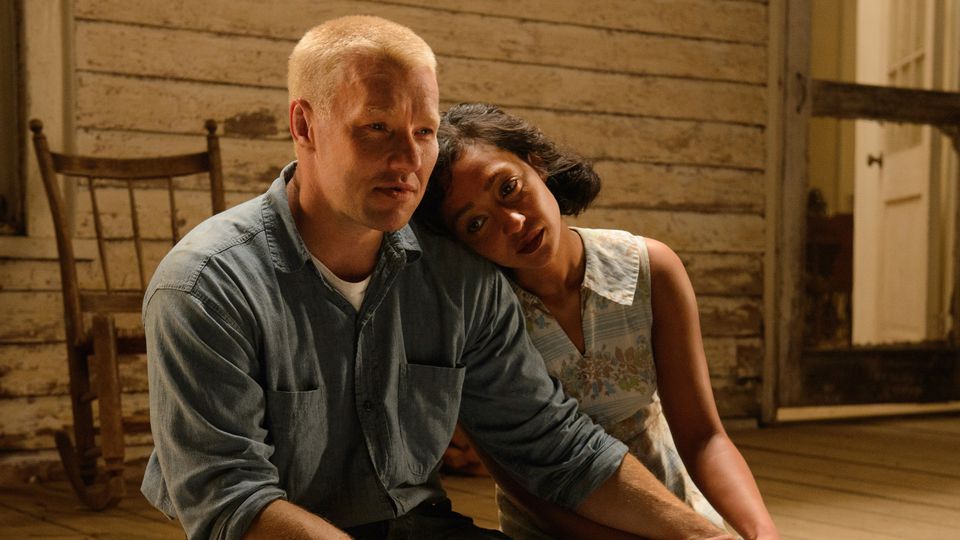DECEMBER 15, 2016
“Loving,” written and directed by Jeff Nichols, is that rare film filled with powerful strengths that does something that films rarely do — it downplays them.
This is particularly surprising given that the subject matter — the landmark court case (Loving v. Virginia) that ruled that any state law barring interracial marriage to be invalid — could easily be played up as a manipulative heart-tugger. I could just see the Lovings’ story turned into one of those HBO Emmy-bait movies complete with inspirational music and cheering crowds — just throw Bryan Cranston and Kerry Washington into the mix and sit back to wait for all the awards to come pouring in.
That’s not what Nichols is offering in “Loving.” Anything but.
Nichols’ approach is not to focus primarily on the legal case — perversely, “Loving” is the story of one of the most famous Supreme Court cases in American history that hardly spends any time at all in the courtroom — but instead he turns all of his attention to the couple involved, Richard Loving (Joel Edgerton) and his wife Mildred (Ruth Negga).
We first meet Richard, a white construction worker in Caroline County, Virginia, he is already in love with his black neighbor Mildred Jeter, and when Mildred learns that she is pregnant, Richard does the right thing and asks her to marry him. Because interracial marriage was illegal in Virginia in 1958, he drives Mildred across state lines to Washington, D.C. where they can wed legally.
Upon their return to Virginia, however, the couple is arrested and thrown in jail for violating the state’s anti-miscegenation law. They manage to avoid a lengthy prison sentence by agreeing not to step foot in Virginia for the next 25 years, a ruling that especially pains Mildred who has always been very close to her family in Virginia.
After tempting fate with another arrest, the Lovings finally move to Washington, D.C., but Mildred is miserable there, not liking city life and missing her family dearly. Inspired by civil rights marches happening in another part of the city, she decides to write Atty. Gen. Robert Kennedy for help in the Lovings’ dilemma, a plea that is answered by the ACLU, which offers to take the Lovings’ fight against the Virginia law all the way to the U.S. Supreme Court.
For a huge court ruling that had profound ramification on U.S. legal history, Nichols has chosen to keep his story small-scale, focusing mainly on the Lovings and their desire just to be able to return to return to Virginia to simply be left alone to love each other.
With that emphasis, “Loving” becomes particularly dependent on the quality of the actors portraying Richard and Mildred, and Nichols has wisely chosen to bypass A-list stars to cast two non-Yanks as the iconic American couple.
As Richard, Aussie Joel Edgerton is virtually unrecognizable with a blonde crewcut and a hunched-over physicality that makes a viewer wonder whether Richard might be developmentally challenged. Yet, his character displays a depth of feeling for Mildred via his gestures and his loving gaze that they trump any verbalization of that love. I would rate it arguably Edgerton’s best on-screen performance.
To stand up to Edgerton’s work, Nichols needed to find an actress who can be strong yet demure, and he found a great one in Irish actress Ruth Negga as Mildred. An actress previously unfamiliar to me, Negga invests Mildred with a strong sense of fairness — she knows that she likely has little power to change things but still has the courage to write that letter or place that call that might…just might…make a change for the better. And Negga does more with her eyes alone that many actors can express in their whole bodies.
It’s true that the lack of bells-and-whistles might make the pace of the film feel a little languid, but stay with Edgerton and Negga, and you won’t be bored. Because Nichols understands that, yes, Loving v. Virginia stood for an important principle, but fundamentally the motion to bring the suit was the love between two people who only wanted to be left alone to enjoy a life together.
GRADE: B+












